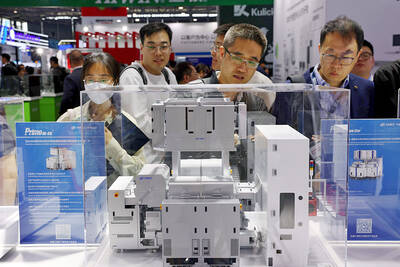The Cabinet has tapped former Democratic Progressive Party (DPP) legislator Charles Chiang (江昭儀) to take up the politically appointed vice chairman's post at the Financial Supervisory Commission (FSC) -- a position left vacant since Lu Daung-yen (呂東英) was made the body's acting head in August 2006.
Facing a term of just more than three months, Chiang yesterday vowed to carry out his tasks to the best of his abilities.
"The premier's office has talked to me about taking over the post, but nothing has been finalized yet," Chiang told the Taipei Times in a telephone interview yesterday.
But Government Information Office Minister Shieh Jhy-wey (
The commission, however, said that it was not aware of Chiang's appointment.
Commission administrative vice chairwoman Susan Chang (張秀蓮) yesterday told reporters that, although the nomination was within the Cabinet's and the president's power, "the commission hasn't been informed."
She said all vacancies, including a replacement for former member Lin Chung-cheng (林忠正), whose term also ends in three months, should be filled as soon as possible to ensure the commission's smooth operation.
The appointment came four days ahead of Saturday's presidential election, which will put Chang's Cabinet in a caretaker role until a new government is formed on May 20.
Chang said last Tuesday that neither civil servants nor politically appointed officials would be reshuffled between the election and May 20.
When questioned by reporters about the appropriateness of the appointment, Chang yesterday defended its legitimacy.
"The decision was made in accordance with the Civil Service Employment Act (
Once his appointment is finalized, Chiang will replace Lu and serve the remainder of Lu's four-year term, which began in July 2004 and ends on June 30 this year.
Chiang said he would use his 30 years of accounting experience to help beef up the commission's regulation of the banking and securities sectors.
He said that he was familiar with the commission's affairs, as he had been a member of the legislature's finance committee, which oversees the commission, for several years.
Chiang, 64, was elected as a legislator for two terms between 2001 and February this year after serving as a member of the now defunct National Assembly.
Certified as a financial accountant in the US, Chiang holds a master's degree in economics from the University of Memphis, Tennessee.
Before returning to Taiwan, Chiang was a long-standing member of the Formosan Association for Public Affairs, headquartered in Washington, and chaired the DPP's US headquarters.

With this year’s Semicon Taiwan trade show set to kick off on Wednesday, market attention has turned to the mass production of advanced packaging technologies and capacity expansion in Taiwan and the US. With traditional scaling reaching physical limits, heterogeneous integration and packaging technologies have emerged as key solutions. Surging demand for artificial intelligence (AI), high-performance computing (HPC) and high-bandwidth memory (HBM) chips has put technologies such as chip-on-wafer-on-substrate (CoWoS), integrated fan-out (InFO), system on integrated chips (SoIC), 3D IC and fan-out panel-level packaging (FOPLP) at the center of semiconductor innovation, making them a major focus at this year’s trade show, according

DEBUT: The trade show is to feature 17 national pavilions, a new high for the event, including from Canada, Costa Rica, Lithuania, Sweden and Vietnam for the first time The Semicon Taiwan trade show, which opens on Wednesday, is expected to see a new high in the number of exhibitors and visitors from around the world, said its organizer, SEMI, which has described the annual event as the “Olympics of the semiconductor industry.” SEMI, which represents companies in the electronics manufacturing and design supply chain, and touts the annual exhibition as the most influential semiconductor trade show in the world, said more than 1,200 enterprises from 56 countries are to showcase their innovations across more than 4,100 booths, and that the event could attract 100,000 visitors. This year’s event features 17

Germany is to establish its first-ever national pavilion at Semicon Taiwan, which starts tomorrow in Taipei, as the country looks to raise its profile and deepen semiconductor ties with Taiwan as global chip demand accelerates. Martin Mayer, a semiconductor investment expert at Germany Trade & Invest (GTAI), Germany’s international economic promotion agency, said before leaving for Taiwan that the nation is a crucial partner in developing Germany’s semiconductor ecosystem. Germany’s debut at the international semiconductor exhibition in Taipei aims to “show presence” and signal its commitment to semiconductors, while building trust with Taiwanese companies, government and industry associations, he said. “The best outcome

Semiconductor equipment billings in Taiwan are expected to double this year, as manufacturers in the industry are keen to expand production to meet strong global demand for artificial intelligence applications, according to SEMI, which represents companies in the electronics manufacturing and design supply chain. Speaking at a news conference before the opening of Semicon Taiwan trade show tomorrow, SEMI director of industry research and statistics Clark Tseng (曾瑞榆) said semiconductor equipment billings in Taiwan are expected to grow by an annual 100 percent this year, beating an earlier estimate of 70 percent growth. He said that Taiwan received a boost from a